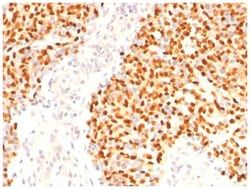Myeloid Cell Marker Antibody (SPM298), Novus Biologicals™
Manufacturer: Fischer Scientific
Select a Size
| Pack Size | SKU | Availability | Price |
|---|---|---|---|
| Each of 1 | NBP232881A-Each-of-1 | In Stock | ₹ 46,636.00 |
NBP232881A - Each of 1
In Stock
Quantity
1
Base Price: ₹ 46,636.00
GST (18%): ₹ 8,394.48
Total Price: ₹ 55,030.48
Antigen
Myeloid Cell Marker
Classification
Monoclonal
Conjugate
Unconjugated
Formulation
PBS with 0.05% BSA. with 0.05% Sodium Azide
Host Species
Mouse
Molecular Weight of Antigen
183 kDa
Quantity
0.1 mg
Primary or Secondary
Primary
Target Species
Human
Form
Purified
Applications
Flow Cytometry, Immunocytochemistry, Immunofluorescence, Immunohistochemistry (Paraffin), Immunohistochemistry (Frozen)
Clone
SPM298
Dilution
Flow Cytometry 0.5-1ug/million cells, Immunocytochemistry/Immunofluorescence 1-2ug/ml, Immunohistochemistry-Paraffin 0.5-1.0ug/ml, Immunohistochemistry-Frozen 0.5-1.0ug/ml
Gene Accession No.
Unkonwn
Immunogen
Human peripheral blood mononuclear cells
Purification Method
Protein A purified
Regulatory Status
RUO
Test Specificity
Recognizes 183kDa protein with DNA-binding characteristics, which is identified as a myeloid specific antigen. BM-1 reacts with myeloid precursor cells and granulocytes in bone marrow. Its antigen appears to be restricted to M2 and M3 acute myelogenous leukemia (AML) subtypes. Markers of myeloid cells are useful in the identification of different levels of cellular differentiation. BM-1 and BM-2 antibodies react with early precursor and mature forms of human myeloid cells. BM-1 MAb is useful in the identification of myelogenous leukemias, distinguishing granulocytic sarcomas from lymphoid malignancies and also in the study of differentiation and transformation of human myeloid cells. The biological function of this antigen is not clear, although it has been proposed that BM-1 may play a role in the differentiation of myeloid cells.
Content And Storage
Store at 4C.
Isotype
IgG1
Description
- Myeloid Cell Marker Monoclonal specifically detects Myeloid Cell Marker in Human samples
- It is validated for Flow Cytometry, Immunohistochemistry, Immunocytochemistry/Immunofluorescence, Immunohistochemistry-Paraffin.

